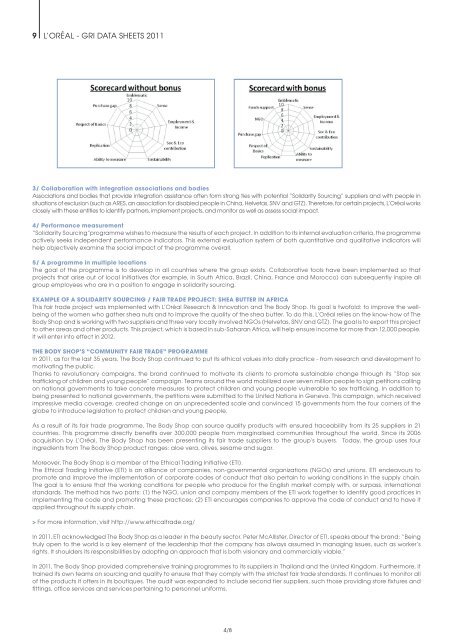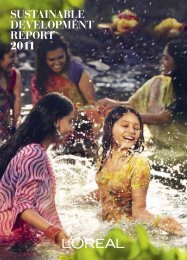Organizational Strategy - Sustainable Development - L'Oréal
Organizational Strategy - Sustainable Development - L'Oréal
Organizational Strategy - Sustainable Development - L'Oréal
Create successful ePaper yourself
Turn your PDF publications into a flip-book with our unique Google optimized e-Paper software.
9 L’OréaL - GrI DaTa SHEETS 2011<br />
3/ Collaboration with integration associations and bodies<br />
associations and bodies that provide integration assistance often form strong ties with potential “Solidarity Sourcing” suppliers and with people in<br />
situations of exclusion (such as arES, an association for disabled people in China, Helvetas, SNV and GTZ). Therefore, for certain projects, L’Oréal works<br />
closely with these entities to identify partners, implement projects, and monitor as well as assess social impact.<br />
4/ Performance measurement<br />
“Solidarity Sourcing”programme wishes to measure the results of each project. In addition to its internal evaluation criteria, the programme<br />
actively seeks independent performance indicators. This external evaluation system of both quantitative and qualitative indicators will<br />
help objectively examine the social impact of the programme overall.<br />
5/ A programme in multiple locations<br />
The goal of the programme is to develop in all countries where the group exists. Collaborative tools have been implemented so that<br />
projects that arise out of local initiatives (for example, in South africa, Brazil, China, France and Morocco) can subsequently inspire all<br />
group employees who are in a position to engage in solidarity sourcing.<br />
EXAMPLE OF A SOLIDARITY SOURCING / FAIR TRADE PROJECT: SHEA BUTTER IN AFRICA<br />
This fair trade project was implemented with L’Oréal research & Innovation and The Body Shop. Its goal is twofold: to improve the wellbeing<br />
of the women who gather shea nuts and to improve the quality of the shea butter. To do this, L’Oréal relies on the know-how of The<br />
Body Shop and is working with two suppliers and three very locally involved NGOs (Helvetas, SNV and GTZ). The goal is to export this project<br />
to other areas and other products. This project, which is based in sub-Saharan africa, will help ensure income for more than 12,000 people.<br />
It will enter into effect in 2012.<br />
THE BODY SHOP’S “COMMUNITY FAIR TRADE” PROGRAMME<br />
In 2011, as for the last 35 years, The Body Shop continued to put its ethical values into daily practice - from research and development to<br />
motivating the public.<br />
Thanks to revolutionary campaigns, the brand continued to motivate its clients to promote sustainable change through its “Stop sex<br />
trafficking of children and young people” campaign. Teams around the world mobilized over seven million people to sign petitions calling<br />
on national governments to take concrete measures to protect children and young people vulnerable to sex trafficking. In addition to<br />
being presented to national governments, the petitions were submitted to the United Nations in Geneva. This campaign, which received<br />
impressive media coverage, created change on an unprecedented scale and convinced 15 governments from the four corners of the<br />
globe to introduce legislation to protect children and young people.<br />
as a result of its fair trade programme, The Body Shop can source quality products with ensured traceability from its 25 suppliers in 21<br />
countries. This programme directly benefits over 300,000 people from marginalised communities throughout the world. Since its 2006<br />
acquisition by L’Oréal, The Body Shop has been presenting its fair trade suppliers to the group’s buyers. Today, the group uses four<br />
ingredients from The Body Shop product ranges: aloe vera, olives, sesame and sugar.<br />
Moreover, The Body Shop is a member of the Ethical Trading Initiative (ETI).<br />
The Ethical Trading Initiative (ETI) is an alliance of companies, non-governmental organizations (NGOs) and unions. ETI endeavours to<br />
promote and improve the implementation of corporate codes of conduct that also pertain to working conditions in the supply chain.<br />
The goal is to ensure that the working conditions for people who produce for the English market comply with, or surpass, international<br />
standards. The method has two parts: (1) the NGO, union and company members of the ETI work together to identify good practices in<br />
implementing the code and promoting these practices; (2) ETI encourages companies to approve the code of conduct and to have it<br />
applied throughout its supply chain.<br />
> For more information, visit http://www.ethicaltrade.org/<br />
In 2011, ETI acknowledged The Body Shop as a leader in the beauty sector. Peter Mcallister, Director of ETI, speaks about the brand: “Being<br />
truly open to the world is a key element of the leadership that the company has always assumed in managing issues, such as worker’s<br />
rights. It shoulders its responsibilities by adopting an approach that is both visionary and commercially viable.”<br />
In 2011, The Body Shop provided comprehensive training programmes to its suppliers in Thailand and the United Kingdom. Furthermore, it<br />
trained its own teams on sourcing and quality to ensure that they comply with the strictest fair trade standards. It continues to monitor all<br />
of the products it offers in its boutiques. The audit was expanded to include second tier suppliers, such those providing store fixtures and<br />
fittings, office services and services pertaining to personnel uniforms.<br />
4/8






